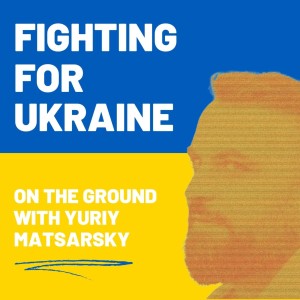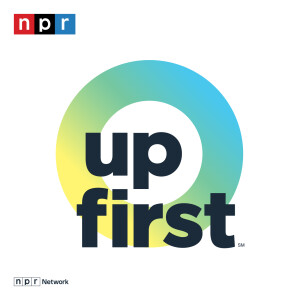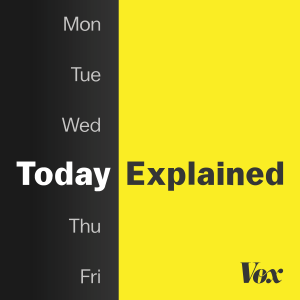

July 3rd 2025
Yuriy recounts a harrowing experience in Cairo during the mass protests against the ruling authorities in Egypt on July 3rd, 2013. He covers the arrest of President Mohamed Morsi, the dangers faced by journalists and foreigners, and the tragic events surrounding the military dispersal of the pro-Morsi encampment at Rabaa al-Adawiya mosque.
You can email Yuriy, ask him questions or simply send him a message of support: fightingtherussianbeast@gmail.com
You can help Yuriy and his family by donating to his GoFundMe: https://www.gofundme.com/f/help-yuriys-family
Yuriy’s Podbean Patron sign-up to give once or regularly: https://patron.podbean.com/yuriy
Buy Yuriy a coffee here: https://bmc.link/yuriymat
Subscribe to his substack: https://yuriymatsarsky.substack.com/
----more----
TRANSCRIPT: (Apple Podcasts & Podbean app users can enjoy accurate closed captions)
It is July 3rd,
12 years ago, around this very day, I woke up drenched in sweat from the stiffing heat in a small hotel room overlooking RI square in Cairo, mass protests against the ruling authorities were unfolding in the Egyptian capital. The day before I had spent time near a military compound on Nasr Street, where the country's president, Mohamed Morsi, recently arrested by the military who had supposedly suddenly sided with the protestors had been brought.
I got back to the hotel quite late. Public transport had come to a halt, and taxi drivers were too afraid to take foreigners since revolutionary checkpoints had sprung up throughout the city. At those makeshift barricades, foreigners were treated as potential enemies.
Morsi had already been held for several days inside the military base near the small Rabaa al-Adawiya mosque. A massive crowd of his supporters had gathered outside. Staying where over time was extremely difficult. I had to prepare and send articles about the situation in Cairo, which was nearly impossible from a tent camp with no electricity or stable internet.
That's when my local colleague, Ahmed Samir Assem stepped in, we agreed to take 10 to 12 hour shifts replacing each other so that both of us would have time to work on our stories and get some rest. If the situation about Rabaa al-Adiwiya began to escalate, the one on shift was supposed to immediately call the other.
Ahmed never called me.
I went down to the nearly empty hotel cafeteria that morning intending to grab a quick breakfast, but I never got to eat. The TV was blaring at full volume with breaking news. On the screen was Ahmed's photo, black and white.
The voiceover reported that he had been killed about an hour early after the military began dispersing the pro-Morsi encampment.
I rushed to Rabaa al-Adawiya. The mosque was on fire. Human bodies were scattered everywhere- dozens, maybe even hundreds. It was impossible to retrieve the dead or wounded anyone who approached the destroyed camp was shot from the fence surrounding the military base.
To this day, no one knows the true number of people killed. At least a thousand, possibly several times more.
Morsi died in prison a few years later, his closest allies were executed, fled the country, or were sentenced to long prison terms.
Mohamed Morsi was not a Democrat, but he was elected president in the first and so far only free and fair elections in Egypt's history.
In 2011, a popular revolution had forced his predecessor Hosni Mubarak to resign after nearly three decades of authoritarian rule.
Morsi and his Islamist supporters were not the main force or even one of the main forces behind with revolution, but they were quick to seize its momentum for their own game.
Morsi made populist promises what were clearly impossible to fulfill immediately. He could not eradicate corruption. He could not quickly end poverty even though he promised to. He placed his hope in divine intervention and said so openly.
The military, many of whom benefited directly from that entrenched corruption, tolerated his reform efforts, his fight against illegal businesses, and his genuine religious devotion for two years. Then they crushed Egypt's fledgeling democracy, along with a beautiful little mosque of Rabaa ad-Adawiya.
The mosque incidentally, was later rebuilt with funds from the Ministry of Defense. It is now, so to speak, the militaries "own" mosque. Democracy, however, no one has tried to rebuild.
One of Ahmed's relatives sought justice for journalists murderers, but had to flee the country after receiving threats. Ahmed's fiance wore mourning clothes for several years then eventually married someone else.
It's all supposed to be in the past. And yet every year in early July, I feel a familiar a gnawing fear. And I suddenly recall the burned mosque and the hundreds of corpses around it.
More Episodes
All Episodes>>Create Your Podcast In Minutes
- Full-featured podcast site
- Unlimited storage and bandwidth
- Comprehensive podcast stats
- Distribute to Apple Podcasts, Spotify, and more
- Make money with your podcast












